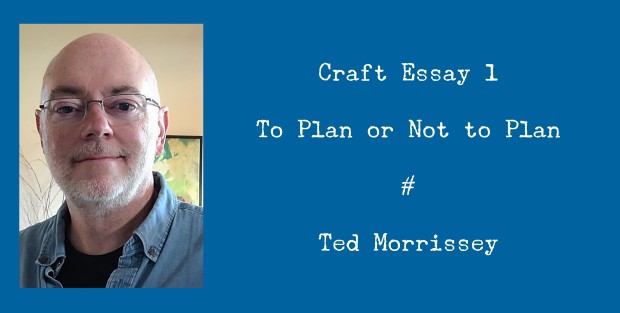
journal | team | miscellany | home
Craft Essay 1:
To Plan or Not to Plan?
Ted Morrissey
For Craft Essay 1, I want to talk about a fundamental issue: Should we, as creative writers, plan what we’re going to write before we begin to draft, or should we just jump in and begin writing a first draft? Well, there’s no “right answer.” I’ve been writing creatively since I was a kid — mainly fictional narratives, but all kinds of other things too — and long ago I came to the conclusion that there are basically two types of creative writers: those who plan before they write, and those who must feel their way along, letting the process itself and the piece they’re producing guide them. I think it’s a matter of personality, and I think it’s very difficult (if not impossible) to work differently than your natural inclination dictates.

When I was working on my master’s (in English with a specialization in fiction writing), one of my teachers was the novelist Kent Haruf, who was a terrific writer and teacher and human being. Kent eventually became my thesis director and a valued mentor and friend. Kent was a planner. Before writing a novel, he would draft a detailed outline, with a roman numeral for each chapter, and a list of plot points, as well as character and setting details. So when he wrote the novel, he would systematically follow the outline he created beforehand. I thought, “Oh, that’s how you write a novel,” so I started trying to write that way. It did not work for me. At all. I could write a research paper that way, or literary analysis, or a piece of journalism — but the creative part of my brain just wouldn’t function in that pre-planning mode.
Instead I had to feel my way along the narrative, inventing as I went, often being surprised by the twists and turns that presented themselves: developments I had no idea were coming in the story until there they were. I think for a time I thought I was doing it wrong, but I came to understand that a lot of writers (and other creative types) function that way. Much later, when I was working on my doctoral dissertation, I discovered William H. Gass, who has become my literary idol. Gass (1924-2017) was very much an organic writer. Besides his novels, novellas and short stories, Gass wrote a lot of nonfiction, including a lot of craft essays; plus he was a generous granter of interviews. Therefore, I have a lot of favorite Gass quotes about the writing process. I’ll share a couple with you (keeping in mind I’m not advocating his approach as the correct approach, but simply an approach).
Here’s a meme I made with one of the quotes:

In other words, Gass found that if he tried to plan what he was going to write beforehand, it turned out stale and lifeless. On the other hand, if he felt his way along while writing, letting the material itself guide him, the resulting narrative was much more interesting and lively. As someone who takes this approach myself, I will say it is a somewhat scary way to write. One has to trust the process, and trust that eventually the story or the novel or the poem (or whatever) will come together.
Gass described his rather rudderless writing process this way:
“I always have to try to figure out from what I’ve done what should come next, and then I find out from looking at this lump that I can’t see anything that comes next. If I can’t see anything that comes next, I have to rewrite what I’ve done until there is something that comes next. So, I rewrite that, and when I rewrite that it becomes a bigger lump, and that’s what comes next” (Conversations with William H. Gass, p. 43).
So, if you’re a planner — fantastic! The approach definitely works for some creative writers. But if you’re a jump-in-head-first-and-figure-it-out-as-you-write writer — also fantastic! I don’t think either approach is better or worse than the other. It just depends on your personality, and maybe also on the specific project itself.
Here’s a brief video with a few other thoughts on getting started. (Correcting a slip of the brain/tongue in the video: I write my academic stuff — critical articles, reviews, etc. — via a keyboard.)
▪ ▪ ▪
Ted Morrissey’s novel excerpts, short stories, poems, critical articles, reviews, and translations have appeared in more than a hundred publications. Among his award-winning novels are Crowsong for the Stricken, Mrs Saville, and The Artist Spoke. Delta of Cassiopeia: Collected Stories and Sonnets was released in 2023. He is a lecturer in Lindenwood University’s MFA in Writing program, and also teaches creative writing and literature courses for Southern New Hampshire University. His craft essays have been culled from his lecture notes. Visit tedmorrissey.com and follow on Twitter @t_morrissey.
journal | team | miscellany | home